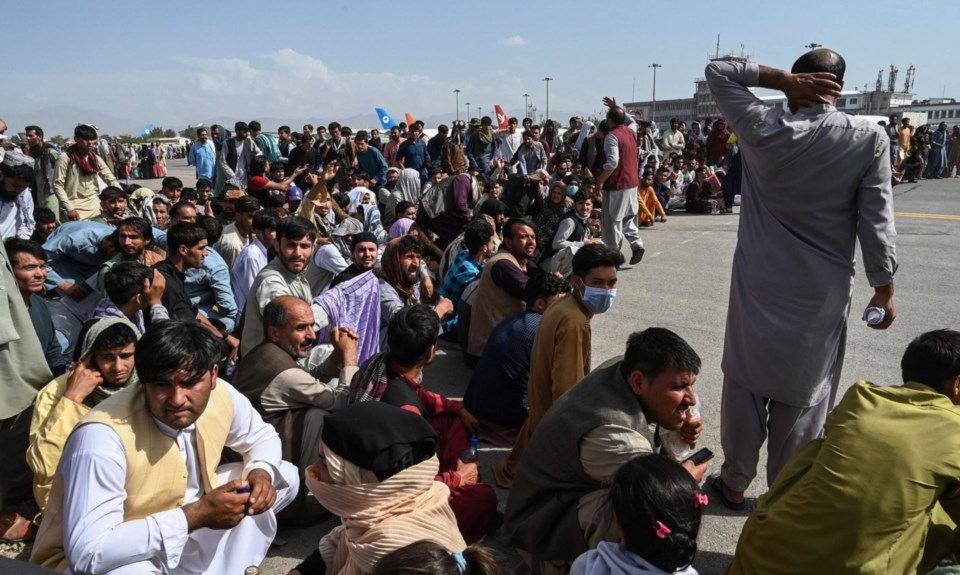Muji.Iqbal
Senior Member
- Apr 18, 2023
- 3,053
- 1,039
- Country of Origin

- Country of Residence

Was it all in vain?
Dene Moore: Scenes of a triumphant Taliban will stay with us – and they should, because we abandoned our friends and allies to a terrible fate.Dene MooreAug 20, 2021 2:47 PM

In another lifetime, I remember visiting a radio station being broadcast by Canadian Forces in Kandahar. The station was in a shabby but heavily fortified outpost in the Zhari District, run by the Canadians’ psychological operations division by two young Afghan-Canadian soldiers.
From here they hosted a series of programs meant to counter a fairly sophisticated Taliban propaganda campaign in its home territory. The most popular shows were call-ins and I expected there were a lot of political rants and anger.
Nope.
Most called in to recite poetry, some written by the callers themselves, some traditional poetry banned under Taliban rule. Mostly about love.
The scenes out of Afghanistan right now are heartbreaking. The politics of the U.S. withdrawal aside, the unfolding humanitarian catastrophe was preventable.
The scenes of triumphant Taliban fighters occupying the presidential palace and patrolling the streets, guns in hand; of terrified Afghans clinging to the body of a U.S. military plane as it takes off from Kabul airport; the collapse of two decades of Western warfare in a matter of days: these will stay with us.
I worry for the journalists and fixers and interpreters who worked with Canadians and other coalition entities, including military, news and aid organizations.
I worry for the women and girls who had such hopes, walking miles to attend the girls school opened by Canadians in Kandahar.
I worry for all Afghans who remember all too well Taliban rule, public hangings, books burnings, women covered in burqas head to toe and hiding at home, considered property of men akin to livestock.
I worry for the families and friends of the 158 Canadian soldiers and seven civilians who died in Afghanistan, and the thousands who were injured, and the many thousands more who served who must feel their sacrifice seems right now to have been in vain.
The way the Western exit from Afghanistan is unfolding is emblematic of the 20-year war in Afghanistan, a final testament to how little the Western coalition ever understood of what was happening on the ground or how to counter it.
It has been more than a year since the Trump administration “negotiated” a withdrawal agreement with the Taliban, an agreement the U.S. stuck to, drawing down troops from 13,000 to 2,500 despite continued attacks by the Taliban. President Joe Biden delayed the exit a few months but continued with the plan although the Taliban openly declared it would continue with its war on the Afghan government.
Biden defended his decision, and justifiably declared that there would be not good time for the U.S. to leave Afghanistan.
But when he says it was a war “that Afghan forces are not willing to fight for themselves,” he is wrong.
When he says, “We gave them every chance to determine their own future. What we could not provide them was the will to fight for that future,” he is wrong.
More than 47,000 Afghan civilians and up to 69,000 Afghan military and police have died. They have fought.
It is not only on the shoulders of the Americans that the blame lies. Canada ended its war there in 2014 but our allies deserved better than the vague 11th-hour promises we’ve heard from Ottawa. Without a clear commitment, more Afghans will die.
I have yet to see any public pressure exerted from the Canadian media or non-governmental organizations that relied on those Afghans who worked beside them demanding better. I can only hope there is more happening behind the scenes.
Time will tell.
Our Afghan allies did not leave when Canada did because they don’t want to leave their country. They love it, and they stayed to keep up the fight.
That fight is far from over but in the immediate future they need to be safe. They will be targeted for working with Canadian and other Coalition organizations and many already have been.
Our war in Afghanistan may be over but our chance to help is not. Make it an issue in this unnecessary and tone-deaf election.
Dene Moore is an award-winning journalist and writer. A news editor and reporter for The Canadian Press news agency for 16 years, Moore is now a freelance journalist living in the South Cariboo. Moore’s two decades in daily journalism took her as far afield as Kandahar as a war correspondent and the Innu communities of Labrador. She has worked in newsrooms in Vancouver, Montreal, Regina, Saskatoon, St. John’s and Edmonton. She has been published in the Globe and Mail, Maclean’s magazine, the New York Times and the Toronto Star, among others. She is a Habs fan and believes this is the year.
SWIM ON:
- Dene Moore last wrote that it’s no secret there are lower vaccination rates in northern and interior BC. But the reasons why aren’t as simple as many think.
- In March 2020, Rashid Husain Syed shared details of the Russian/Saudi crude oil "war."
- Robert McGarvey reflected on the Great War of 1914-1918, and how it shaped the world of today.

Was it all in vain?
Dene Moore: Scenes of a triumphant Taliban will stay with us – and they should, because we abandoned our friends and allies to a terrible fate.
 www.theorca.ca
www.theorca.ca
The scene of the Afghan Taliban capturing the Afghanistani Palace, will be remembered by the world forever.




